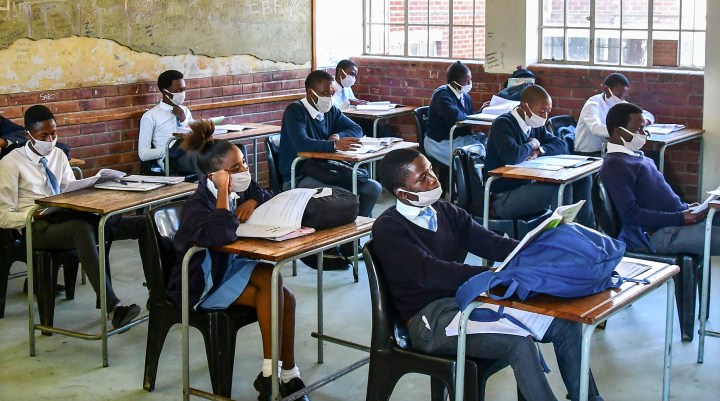MAVERICK CITIZEN
Decolonise the schools: Education is key to transforming South African society, say activists

Activists say the education system in South Africa is based on oppressive colonial principles and needs to be recontextualised to reflect values of shared knowledge, inclusion and critical thinking in order to transform society.
On Tuesday, 22 June, youth online publication Ukuzibuza hosted a discussion titled, “The need for education in today’s society”.
Former education MEC Mary Metcalfe said that, for her, school was where teachers had pushed her to have a point of view and challenged her to defend that point of view. She said it was about education as well as being a place for social learning.
According to Metcalfe, learners need to be in schools that enable them to reach their potential, “which means teachers who recognise that learners are not empty vessels must give them the space to critically reflect, to think about community, to recognise they need to have access to books, to ideas, to space to think”.
Government needed to create an environment conducive to learning, said Metcalfe. However, government was not doing this in terms of providing things like textbooks, sanitation and teaching support for educators. She said the reason for this was the huge social inequalities that existed in the country.
Answering a question on whether it is the job of schools to teach values, Meltcalfe said, “You don’t decide if you want to teach values or not; the way the school operates reflects values. When you don’t provide toilets to learners, or you provide toilets that are completely infrastructurally unsound, you’re communicating a particular value in terms of how you treat children… how we treat people.”
Author and activist Sizwe Mpofu Walsh said that disassembling a “colonially fashioned education system” and remaking it was fine, but that it would take time. He said it was important to realise we would not be able “to see a perfect system in advance”.
With regard to making sense of what decolonising education meant, Mpofu Walsh said the things that needed to be re-evaluated were Western-focused reading lists, the fact that teaching bodies are grossly unrepresentative of race and gender, and that school governing bodies still reflected “an apartheid pattern of privilege”.
Mpofu Walsh said education is the bedrock of society and that transforming the education system would transform society.
Head of Equal Education’s political and training programme, Reshoketswe Mapokgole, said that when we think about schools in South Africa, we should be contextualising them against the backdrop of being a formerly colonised country, and consider what transformation would look like in terms of teaching and the relationship between schools and their communities.
Mapokgole shared her experience of being at the African Leadership Academy (ALA). She said that while in traditional schooling she found the education alienated students from their communities, at the ALA she felt more connected to the community.
“What it reinforced was that you learn so you can engage the community… so you can be part of this community, because essentially if we are saying we’re developing the next generation of African leaders, we need to come back to these same communities where we live and transform them,” Mapokgole said.
She said key to the learning experience at the ALA was the encouragement to be curious and critical of the information we constantly receive and consume.
Mapokgole explained that decolonising schools and curriculums was necessary because colonisation was designed to oppress and disempower people. Speaking practically of decolonising schools, she said the way in which teachers are trained also needs to change and that they need to buy into the idea of decolonisation.
She said that Equal Education championed the idea of teachers facilitating discussions as opposed to simply imparting information, as that created an environment of mutual exchange between learners and teachers. DM/MC


















 Become an Insider
Become an Insider
Slogans seldom help. however since it is the season for slogans I suggest that this one could gain traction “TAKE THE ANC OUT OF EDUCATION”.
I can’t agree more. The more the ANC transform the education system the less pupils in grade 6 can read and write? What about maths, reading, writing, biolog, history etc is colonized? Do we go back to teaching how to construct mud huts? What part of the human skeleton is colonized or what part of the alphabet is colonized? May every voter wake up and vote out the ANC in the next election.
Whether the system represents colonial ideas or is being decolonised will make NO difference, as long as teachers are under-qualified or abuse children.
I still don’t understand what a de-colonised education means. What would the curriculum look like, would uniforms still be compulsory, what would the language of instruction be etc. The same goes for the quest by some to de-colonise business.
I wish a well-read scholar can put forward a proper understanding of what exactly is meant by de-colonising education. This article, like so many before it, failed dismally in this regard.
The word ‘transform’ is also used very loosely. From what to what? With what aims in mind? What improvement will it bring? Whose idea will the future scenario be? These vague articles all contain some idea of an utopia that cannot be pinpointed properly.
Whilst there is no doubt that history needs to include all sides of the story, for the rest maths is maths etc
This whole decolonising movement assumes we are not living in a global village. Wake up, learn what there is to learn and compete. It’s tough out there!